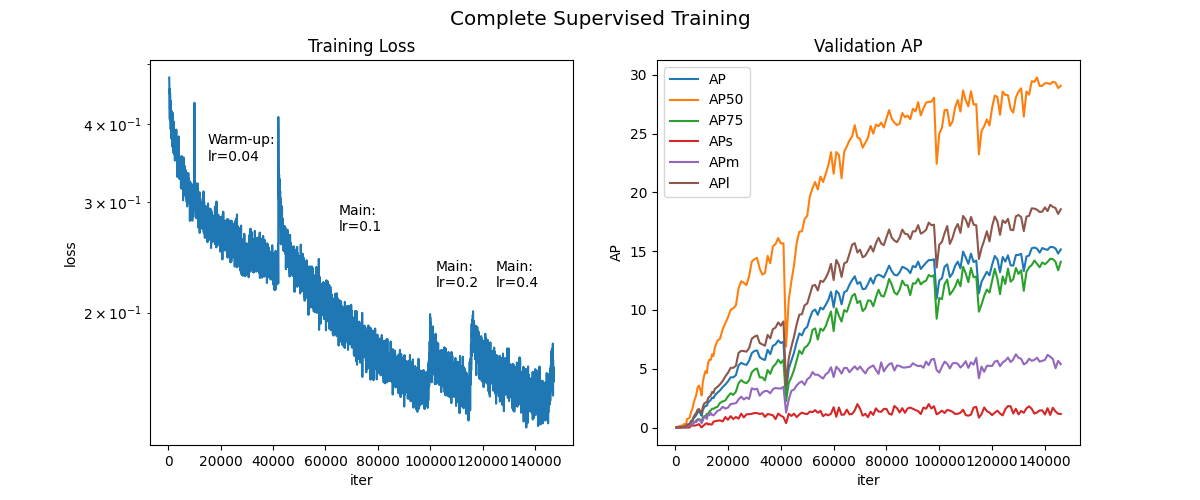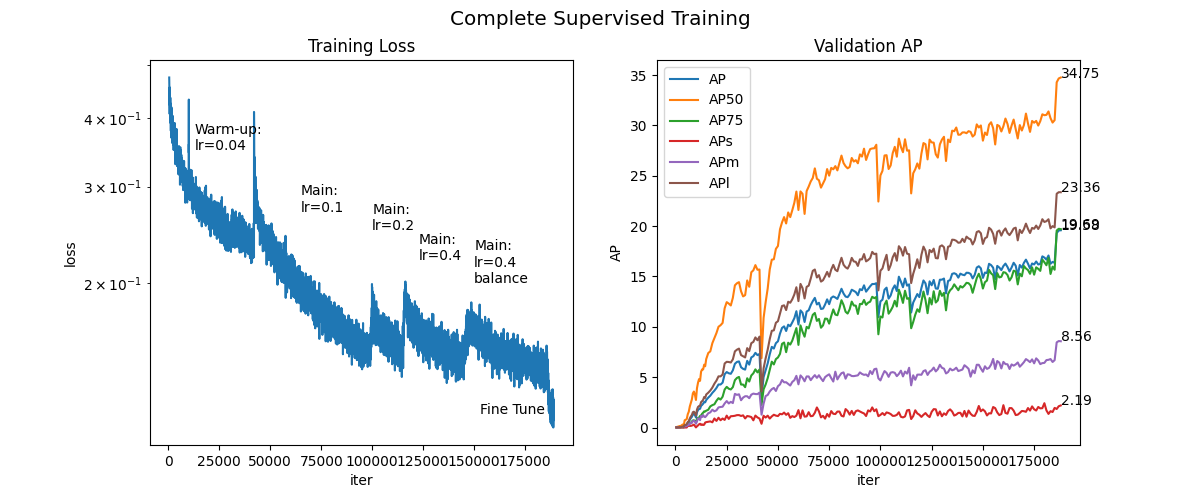This is the project for NYU Fall 2022 DS-GA 1008 Deep Learning final competition.
| Paper | Video |
|---|
The dataset of this project can be downloaded at [here].
It is composed of 30,000 labeled train images, 20,000 labeled validation images, and 512,000 unlabeled images. An example of image and label training data pair is shown as following,
Object Detection task is a well known computer vision task that aim to locate the objects in the image and classifying them. The most well known dataset is COCO. Many algorithms have been proposed since 2014, and the current leaderboard can be found HERE. In general, the traditional supervised object detection classification algorithms are as following,
- Two-stage methods (prioritize detection accuracy):
- Region-based Convolutional Neural Network (R-CNN)
- Spatial Pyramid Pooling Network (SPPNet)
- Fast R-CNN
- Faster R-CNN
- One-stage methods (prioritize inference speed):
- You Only Look Once (YOLO)
- SSD
- RetinaNet
Semi-Supervised Object Detection task has the same goal as traditional object detection task. Different from traditional task, it is aiming at training the deep learning model with limited labeled data and improve the performance by making use a large amount of unlabeled dataset. For example, this competition imcludes 30,000 labeled train images, 20,000 validation images and in additionally provides 512,000 unlabeled images. To achieve a high performance, it is important to make use of the unlabeled data. 🏆
The Semi-Supervised Object Detection leaderboard can be found HERE. Amount the published researches, there are two main direction in utilizing unlabeled images,
- Consistency Based Learning
- Pseudo-label Based Learning
Microsoft [MMDetection], Facebook [Detectron2]
[11/12/2022] After reviewed many supervised and semi-supervised object detection models, we first decided to implement an unbiased-teacher-2.0.
[11/13/2022] We have modified the dataset label from yml format to json format. (Reference: yml_to_jason.py)
[11/14/2022] We started training unbiased-teacher from scratch with using only 30000 labeled data and experimenting with a 99.9% inferring the full dataset training.
The idea failed. Training with no pretrained teacher suffers from gradient exploding (not exactly, but metaphorically) since the prediction is too bad. The process often exit with error
FloatingPointError: Predicted boxes or scores contain Inf/NaN. Training has diverged..
[11/15/2022] We decided to change direction and train a supervised faster R-CNN first with the labeled data. Afterward, we use the model as the pretrained weight to train unbiased-teacher-2.0.
[11/16/2022] ~ [11/18/2022] Implement the function to migrate the weights from supervised R-CNN model to semi-supervised model and using it as pretrain weight for unbiased teacher. Investigated the learning_rate configuration of training supervised faster R-CNN. The model is still suffering from gradient exploding even the current AP is about ~3. We have trained for lr = 0.004, 0.01, 0.02, 0.04 (to balance between gradient exploding and training time) and batch_size=60 using 6 x RTX A6000 for 24 hrs and achieved AP=15.5.
[11/19/2022] We observe the labeled dataset is imbalanced, which lead our model to bias toward majority classes. To overcome this, we used RepeatFactorTrainingSampler to balance samples. Continuing supervised training. Our final fine-tuned supervised model achieved AP=19.5. [Download Model Weight].
[11/20/2022] Finished training supervised model. Starting to train unbiased-teacher-2.0. We are sharing all the pretrained weights from supervised model to both teacher and student in the semi-supervised model. Based on the original paper, unbiased-teacher-2.0 trained about 16 coco dataset epoch to reach the final model. Since NYU unlabeled dataset has 512000 images, with using a batch_size=18, one NYU dataset epoch throughput is equivalent to iter=28500 training. Therefore, in equivalent to 16 dataset epoch, we would need to train a total iter=450000. It is a bit too much, so we are currently aiming at training for iter=150000~225000. The training logs can be found in output folder with figured in [Log Figure].
[11/22/2022] Finished training unbiased teacher. The raw model (not fine-tuned) achieved AP=23.5. We proceed fine-tuning in two step:
- Do the fine-tuning using unbiased teacher with a gradually decreasing learning-rate
lr = 0.008, 0.004, 0.001. The final semi-supervised model achievedAP=24.7. - Transfer the teacher's weight back to supervised model, then do the fine-tuning in supervised training manner. Result: the final semi-supervised model achieved
AP=25.2.
Our final best performing model achieves AP=25.2 on the 20000 image validation dataset. Its derivation steps are Pure Supervise: AP=16.5 -> Supervise fine tune AP=19.5 -> Semi Supervise: AP=23.5 -> Semi Supervise fine tune: AP=24.5 -> Supervise fine fine-tune: AP=25.2. The detail training statistics are as following,
The core of our approach is using the code in save_to_pkl.py to transfer the weight back and forth in between the RCNN FPN and Unbiased-Teacher and training the model repeatedly. Please refer to the output folder for all training logs.
git clone git@github.com:HaowenGuan/NYU-Deep-Learning-Final-Project.git
cd NYU-Deep-Learning-Final-Project- (Optional) Clone Detectron2 Repo,
git clone git@github.com:facebookresearch/detectron2.gitConvert NYU .yml Label to .json using yml_to_jason.py.
Make sure you have cloned detectron2 for this part. Register your objected detection dataset in detectron2/tools/train_net.py with code like,
# register NYU dataset
from detectron2.data.datasets import register_coco_instances
register_coco_instances("nyu_train", {}, "/data/sbcaesar/nyu/labeled_data/annotation/labeled_train.json", "/data/sbcaesar/nyu/labeled_data/train2017")
register_coco_instances("nyu_val", {}, "/data/sbcaesar/nyu/labeled_data/annotation/labeled_val.json", "/data/sbcaesar/nyu/labeled_data/val2017")Then run,
python detectron2/tools/train_net.py --config-file ../../configs/supervised-RCNN/faster_rcnn_R_50_FPN_3x.yaml --num-gpus 6Tuning STEPS, MAX_ITER, IMS_PER_BATCH, CHECKPOINT_PERIOD, BASE_LR, WARMUP_FACTOR, WARMUP_ITERS by yourself in the config file.
Modify the config file configs/supervised-RCNN/supervised_evaluation.yaml to point to your weight path. Make sure the test dataset path is set correctly in the config file and registered in train_net.py. Then run,
python detectron2/tools/train_net.py --eval-only --config-file ../../configs/supervised-RCNN/supervised_evaluation.yaml --num-gpus 6Modify the config file to point to your weight path. Modify the dataset path inunbiased_teacher_train.py and ubteacher/data/datasets/builtin to point to labeled dataset and unlabeled dataset. Then run,
python unbiased_teacher_train.py --config configs/Faster-RCNN/nyu/faster_rcnn_R_50_FPN_ut2.yaml --num-gpus 6Modify the config file configs/Faster-RCNN/nyu/semi_supervised_evaluation.yaml to point to your weight path. Make sure the test dataset path is set correctly in the config file and registered correctly inunbiased_teacher_train.py.
(Optional: Convert the checkpoint
.pthmodel to.pklto do evaluation if you trained your own model. Run,python save_to_pkl.py --save_semi_eval
Then run the testing command,
python unbiased_teacher_train.py --eval-only --config configs/Faster-RCNN/nyu/semi_supervised_evaluation.yaml --num-gpus 6Change config_file in model.py to the path of your config yaml file. In your config yaml file, change WEIGHTS point to your model path. In eval.py, change VALID_DATASET_PATH to your validation dataset path. Then just run
python eval.pyRefer to save_to_pkl.py.



